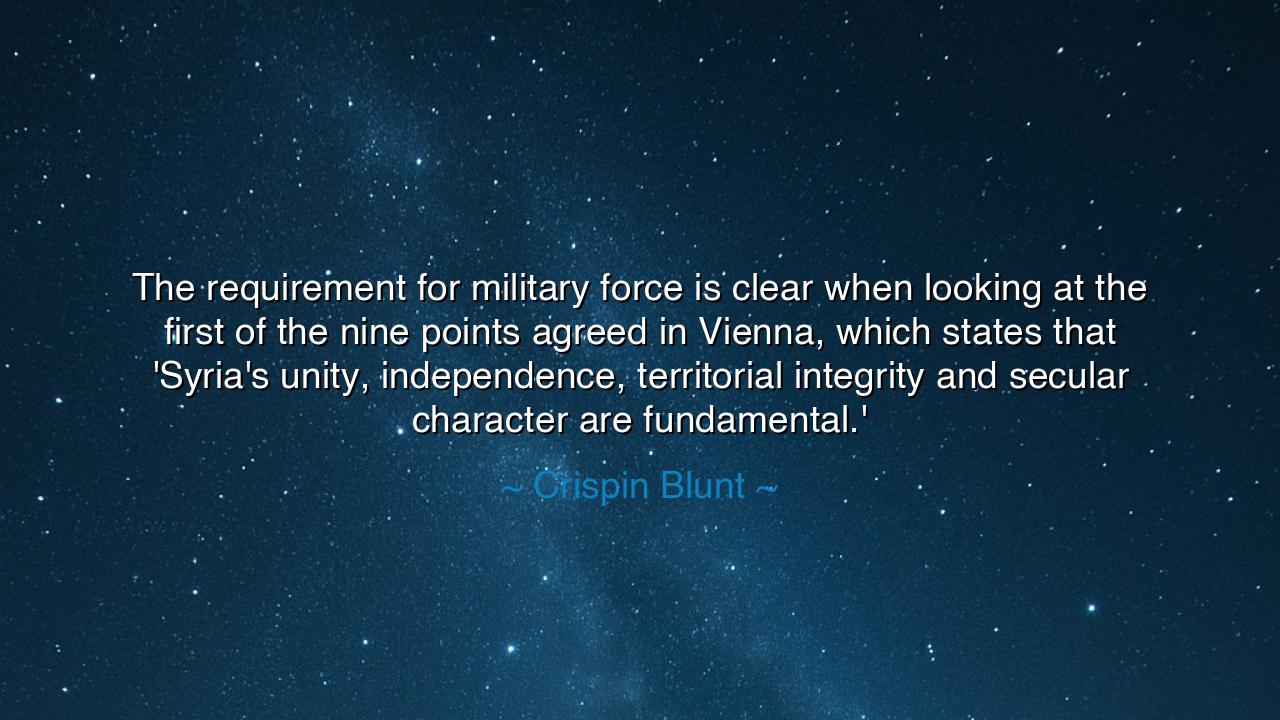
The requirement for military force is clear when looking at the
The requirement for military force is clear when looking at the first of the nine points agreed in Vienna, which states that 'Syria's unity, independence, territorial integrity and secular character are fundamental.'






The British statesman Crispin Blunt, in a time of turmoil and great uncertainty, once declared: “The requirement for military force is clear when looking at the first of the nine points agreed in Vienna, which states that ‘Syria’s unity, independence, territorial integrity and secular character are fundamental.’” In these solemn words, he speaks not as one who glorifies war, but as one who recognizes the grave necessity of strength in the defense of principle. His reflection emerges from the smoke and sorrow of modern conflict — from the ruins of a land once ancient and proud — and it reminds us that peace cannot exist without the guardianship of those willing to protect it.
To understand the meaning of his statement, we must return to the Vienna talks of 2015, when the world’s powers gathered in an attempt to end the Syrian Civil War. Amid the suffering of millions and the chaos of collapsing order, nine guiding points were established to shape a vision for peace. The very first of these proclaimed that Syria’s unity, independence, territorial integrity, and secular character were sacred — that no peace could endure if the nation were torn apart by sectarianism, division, or foreign domination. Yet even as these words were written, the fires of war still raged, and diplomacy alone could not still the thunder of guns. Thus Blunt, with a realist’s wisdom, declared that the use of force — disciplined, measured, and just — was sometimes necessary to defend the ideals that peace itself demanded.
This is an old truth, older than empires and kingdoms. For throughout history, the bond between peace and power has never been severed. The philosophers of antiquity knew that to speak of unity and independence was to speak also of protection. Thucydides, chronicler of the Peloponnesian War, warned that words and treaties are fragile unless the will to uphold them stands firm. Likewise, when the Roman Empire’s legions guarded the frontiers of their vast dominion, they understood that the Pax Romana — the Roman Peace — was not born of gentleness alone, but of vigilance and sacrifice. Crispin Blunt’s words, though spoken in the language of modern diplomacy, echo this ancient law: that peace is not the absence of struggle, but the triumph of order over chaos.
To grasp the depth of this wisdom, consider the tragedy of Syria itself — a land that has long been the crossroads of civilizations. Once a cradle of culture and faith, it became the stage for a conflict that drew in nations, tribes, and ideologies from every horizon. The dream of unity was shattered by factionalism; the independence of the nation was weakened by the ambitions of others. Amid such division, Blunt’s invocation of unity and territorial integrity is not a call to conquest, but a call to restoration — a plea that the pieces of a broken nation be held together, not by domination, but by principle.
Yet his emphasis on secular character carries a meaning even deeper. It is the recognition that no lasting peace can exist where faith is turned into a weapon and where the identity of one group becomes the enemy of another. A secular Syria — in Blunt’s vision — is not a denial of religion, but the protection of all beliefs under one banner of equality. And for such a balance to survive in the tempest of fanaticism, the shield of strength must stand firm. Thus, the requirement for military force becomes not a hunger for power, but a defense of harmony — a necessary burden borne by those who would safeguard freedom.
History offers a mirror to this truth. When the free nations of the world rose against tyranny in the Second World War, they did not do so in lust for battle, but in defense of civilization itself. The Allies understood, as Blunt does, that some evils cannot be reasoned with — they must be resisted. Just as they fought to preserve the independence of nations from the darkness of totalitarian rule, so too must modern nations be ready to act, with unity and moral purpose, to preserve the sovereignty and dignity of others.
From this reflection arises a lesson that stretches beyond politics and war: ideals are only as strong as the will that defends them. Whether for nations or for individuals, unity, independence, and integrity cannot survive through words alone — they require courage, endurance, and the readiness to act when threatened. Each of us, in our own sphere, must guard the principles that sustain peace: truth, justice, and respect for the freedom of others.
So let us take Blunt’s words as both a warning and an exhortation. The use of force, though lamentable, is sometimes the duty of those who love peace most. To preserve unity, we must confront division. To uphold independence, we must resist oppression. And to defend integrity, we must never shrink from the responsibilities that freedom demands. For as long as humanity endures, the harmony of the world will depend upon those who, when called, stand firm between the light of justice and the gathering darkness — not as conquerors, but as keepers of peace eternal.






AAdministratorAdministrator
Welcome, honored guests. Please leave a comment, we will respond soon